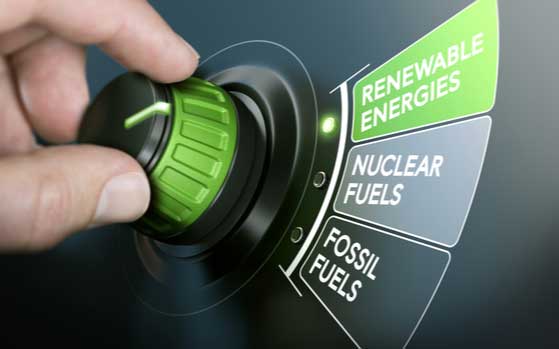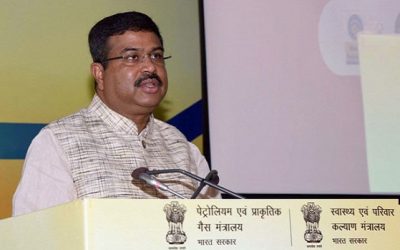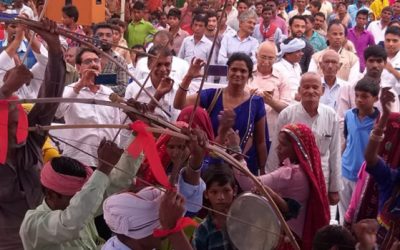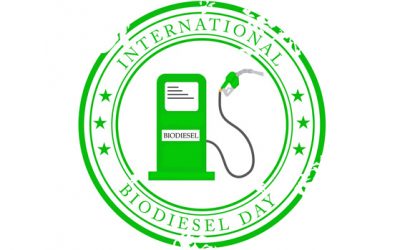Reports have appeared in a section of media, citing a CRISIL report, that India may fall short of its declared renewable energy target of 1,75,000 MW by the year 2022. The Ministry of New & Renewable Energy has refuted such claims. Full text of Ministry’s rebuttal is as below –
“In some of the recent media reports apprehensions have been raised whether India would be able to achieve 1,75,000 MW renewable power installed capacity target by the year 2022. All these have cited the CRISIL report of September 2019.
However, the doubts are ill-founded and not reflective of the status on the ground and plans ahead. By the end of September 2019, India has installed more than 82,580 MW of renewable energy capacity with around 31,150 MW of capacity under various stages of installation. Thus, by the first quarter of 2021, India would have installed more than 1,13,000 MW of renewable power capacity. This would constitute nearly 65 per cent of the targeted capacity. Besides this, around 39,000 MW of renewable power capacity is at various stages of bidding which would be installed by September 2021, taking the percentage of installed capacity to over 87 percentage of the targeted capacity. With only 23,000 MW of renewable power capacity left to bid, India is confident that the target of installing 1,75,000 MW of renewable power capacity will not only be met but exceeded.
The Ministry has worked systematically to resolve various issues that arise from time to time, putting in place facilitative and ease of doing business policies and programs for achieving the goal. Renewable power industry, developers, investors and other stakeholders have lauded Ministry’s efforts nontransparent bidding and facilitation for procurement of power at competitive rates. These initiatives have resulted in significant downward trend in solar and wind power tariffs. The wind power tariffs has fallen from Rs 4.18 per unit in 2016 to Rs 2.43 per unit during last year and even today it remains below Rs 2.75 per unit. Similarly, the solar tariffs have fallen from Rs 4.43 per unit (with VGF) to Rs 2.44per unit. The Government of India’s endeavor remain that renewable power is procured at a rate which is acceptable to distribution companies.
Since March 2014, India’s renewable power capacity has increased from 34000 MW to 82,580 MW recording 138 percent growth. Globally, India stands 5th in solar power, 4th in wind power, and 4th in total renewable power installed capacity. If large hydro included, India stands 3rd in renewable power capacity globally. India’s renewable energy program is much beyond production of electricity and covers a basket of applications including use of solar thermal energy for cooling, heating, drying and other industrial applications. Renewable energy has emerged as a true multi-benefit system, combining ecological necessities with domestic priorities, economic and job creation opportunities.
The journey for expanding the share of renewables in the energy mix has not been without continuous challenges. When the State Government of Andhra Pradesh announced intention to revisit already signed Power Purchase Agreements (PPAs), the Ministry very quickly clarified that no PPAs can be revisited unless there is a clause to do so in such agreement or a case of malafide of corruption is proved beyond doubt.
The Ministry in consultation with the respective Governments is addressing the issues of allocation of land in Gujarat and revision of land facilitation charges in Rajasthan. Plan for erecting 66,500MW of additional transmission system to ensure evacuation and injection of 1,75,000 MW of power into the main grid is under implementation. The additional transmission would come by October 2021 in phases depending on location-based requirements. Also, the Ministry is in the process of developing Ultra Mega Renewable Energy Parks to overcome the problem of land allocation. These parks will have dedicated transmission. First such park is being planned in Dholera, Gujarat by SECI. These apart, the Ministry has strengthened PPA clauses for strengthening investors’ confidence. For mitigating off-takers risk and ensuring timely payments to developers, the Ministry has made letter of credit must for purchase of power by distribution companies.
The Ministry has launched three new schemes. The first is the Central Public Sector Undertaking (CPSU) Scheme Phase-ll for setting up 12,000 MW grid-connected SPV Power Projects, by the Government Producers with Viability Gap Funding (VGF) support of Rs 8,580 crore for self-use or use by Government or Government entities, both Central and State Governments. The Scheme mandates use of both SPVcells and modules manufactured domestically as per specifications and testing requirements.
The second is PM-KUSUM (Pradhan Mantri Kisan Urja Suraksha evem Utthan Mahabhiyan) scheme to be implemented over next four years for de-dieselization of the farm sector and increasing farmers’ energy independence and income. Under the scheme, India has plans to provide 1.75 million stand-alone solar agriculture pumps and carry out solarization of 1 million grid connected agriculture pumps by the year 2022. Under the same scheme, Government is also encouraging farmers to set up small solar plants of the size of 500 KW to 2 MW on barren lands for their additional income. Three components combined, the scheme aims to add a solar capacity of 25,750 MW by 2022. The total central financial support provided under the scheme would be Rs 34,422 crore. The third is Roof Top Solar Phase-II program SRISTI (Sustainable Rooftop Implementation for Solar Transfiguration of India) scheme for accelerated deployment of solar roof top systems in the country. Under this scheme Central Financial Assistance for 4000 MW of small roof top capacity and incentives to Distribution Companies for 18,000 MW capacity by 2022 have been provided. These schemes will also act as catalyst for adding solar cell and module manufacturing capacity in India. Further, the Tariff Policy is being revised to ensure timely adoption of tariffs.
The CRISIL report being referred to by the media is neither factually correct nor takes into account initiatives taken by the Ministry of New and Renewable Energy to facilitate accelerated development and deployment of renewable energy in the country. This report lacks in credibility in all respects as CRISIL did not even bother to consult this Ministry for its views. The Ministry says it is not only confident of meeting 1,75,000 MW target but exceeding it by 2022.











 Union HRD Minister Ramesh Pokhriyal ‘Nishank’ will launch ‘Samagra Shiksha-Jal Suraksha’ drive to create awareness about water conservation among all school students in the country. This mega drive would be launched at Dr. Sarvepalli Radhakrishnan Auditorium, Kendriya Vidyalaya No. 2 in Delhi Cantt.
Union HRD Minister Ramesh Pokhriyal ‘Nishank’ will launch ‘Samagra Shiksha-Jal Suraksha’ drive to create awareness about water conservation among all school students in the country. This mega drive would be launched at Dr. Sarvepalli Radhakrishnan Auditorium, Kendriya Vidyalaya No. 2 in Delhi Cantt.
 World Biofuel Day is observed every year on 10th of August to create awareness about the importance of non-fossil fuels as an alternative to conventional fossil fuels and highlight the various efforts made by Government in the biofuel sector. Ministry of Petroleum & Natural Gas will organize World Biofuel Day on 10th August 2019 at Vigyan Bhavan, New Delhi. Minister of Petroleum & Natural Gas & Steel Dharmendra Pradhan will inaugurate the program. Minister of Health & Family Welfare, Science & Technology and Earth Sciences Dr Harsh Vardhan will be the Chief Guest of the function. This year the theme of the World Biofuel Day is “Production of Biodiesel from Used Cooking Oil (UCO).”
World Biofuel Day is observed every year on 10th of August to create awareness about the importance of non-fossil fuels as an alternative to conventional fossil fuels and highlight the various efforts made by Government in the biofuel sector. Ministry of Petroleum & Natural Gas will organize World Biofuel Day on 10th August 2019 at Vigyan Bhavan, New Delhi. Minister of Petroleum & Natural Gas & Steel Dharmendra Pradhan will inaugurate the program. Minister of Health & Family Welfare, Science & Technology and Earth Sciences Dr Harsh Vardhan will be the Chief Guest of the function. This year the theme of the World Biofuel Day is “Production of Biodiesel from Used Cooking Oil (UCO).”

0 Comments